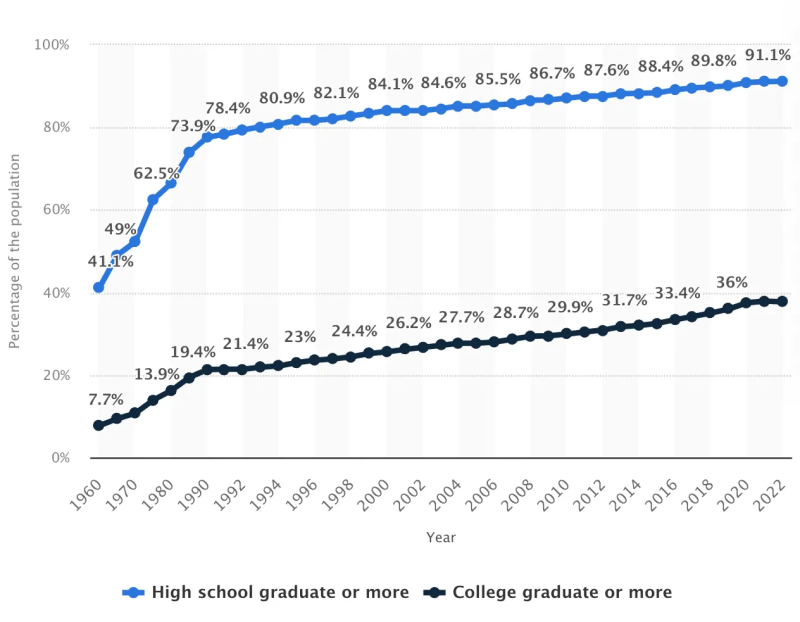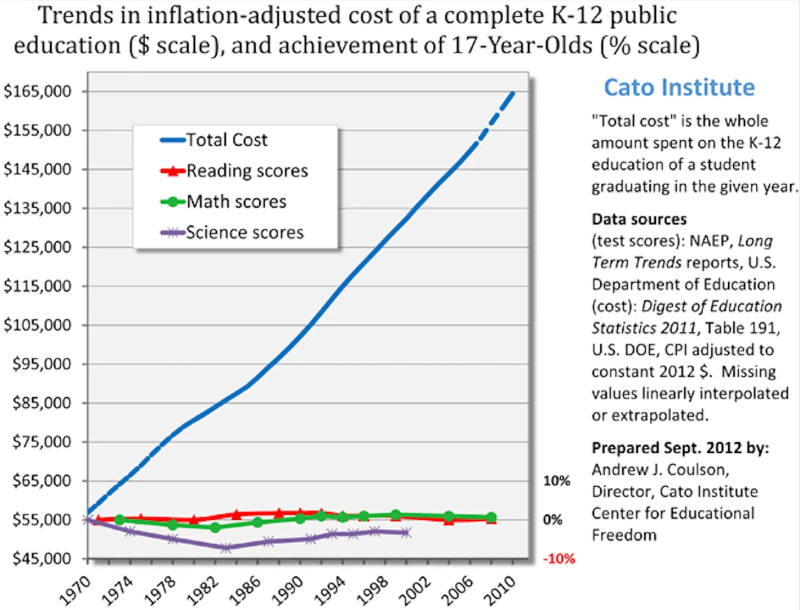
It’s a modern fetish that we’re brilliant while our ancestors were idiots. After all, they didn’t have iPhones, the Internet, or Kim Kardashian.
This is also academic consensus, for what it’s worth: called the Flynn effect, the idea is people do better on puzzles so we must be smarter.
Of course, one wonders if puzzles translate into, say, understanding monetary policy or how welfare destroys families.
The Rise of Dumb Politics
Thankfully, we have a real-world test: actual political campaigns.
Back when I was a professor, I ran every inaugural address through a Flesch-Kincaid text analysis to measure the grade level. The logic is that top speechwriters know how to talk at voters’ level.
Going by grade level, it turns out we are getting dumb breathtakingly fast.
In 1900 inaugurals were written between 13th and 14th grade – modern college level. Today they’re 8th grade for Obama, 9th grade for Trump, and…7th grade for Biden.
It gets worse the further back we go: Andrew Jackson’s 1828 inaugural was written at 22nd grade – meaning, strictly speaking, two PhD’s was the median voter in 1828.
Keep in mind Jackson was a populist man-of-the-people – Washington’s inaugural was closer to 26th grade.
Also, keep in mind almost nobody in 1828 – or 1789 – had a formal education.
Jackson kicks off with “Undertaking the arduous duties that I have been appointed,” Washington starts with “Among the vicissitudes incident to life,” for Biden it’s “This is America’s day.”
So how did we get so dumb?

Public School: Indoctrination, Not Education
The modern government school came from 1800’s Prussia, which had enough of worker riots and peasant revolts and resolved to indoctrinate kids into pro-regime obedience.
It worked a charm, turning the once unruly Germans into a government-directed army that went on to do terrible things.
Left-wing American intellectuals were fascinated by Prussia’s indoctrination and imported it to the US. They were motivated not by peasant revolts, but by the frustratingly small-government ethos of Catholics.
Progressives figured they couldn’t frog-march American Catholics into government utopia, but they could have the children.
These activists spread government schools to every state and got a major boost post-war, when competency tests were declared discriminatory, forcing companies to instead rely on formal education to discover talent.
This launched the university from a fringe toy for the 1% into a $300,000 tax on anybody hoping for a white-collar job.
Meanwhile, like all government programs, opportunists – teachers’ unions – took over, spending $878 billion per year dutifully peddling politics but neglecting the actual purpose of education, leaving American kids illiterate and innumerate.
In a video last year I mentioned how fully 23 Baltimore schools had precisely zero students proficient in math, and in Detroit, 96% of students lack proficiency in math – 95% can’t even read. But by gum, they know their demi-genders.
Take people who can’t name a state or don’t know what the Supreme Court is, wash them with decades of left-wing propaganda, stick them in a voting booth, and here we are.

Conclusion
If we’re to save our democracy, we have to save our voters – by replacing government schools with schools that actually teach instead of indoctrinate.
That could mean school choice, it could mean vouchers, it could mean homeschooling co-ops. But until we fix it, things will keep getting worse.
For more on the destruction of American education, read Murray Rothbard’s classic “Education: Free and Compulsory.”
Republished from the author’s Substack
Disclaimer
Some of the posts we share are controversial and we do not necessarily agree with them in the whole extend. Sometimes we agree with the content or part of it but we do not agree with the narration or language. Nevertheless we find them somehow interesting, valuable and/or informative or we share them, because we strongly believe in freedom of speech, free press and journalism. We strongly encourage you to have a critical approach to all the content, do your own research and analysis to build your own opinion.
We would be glad to have your feedback.
Source: Brownstone Institute Read the original article here: https://brownstone.org/

